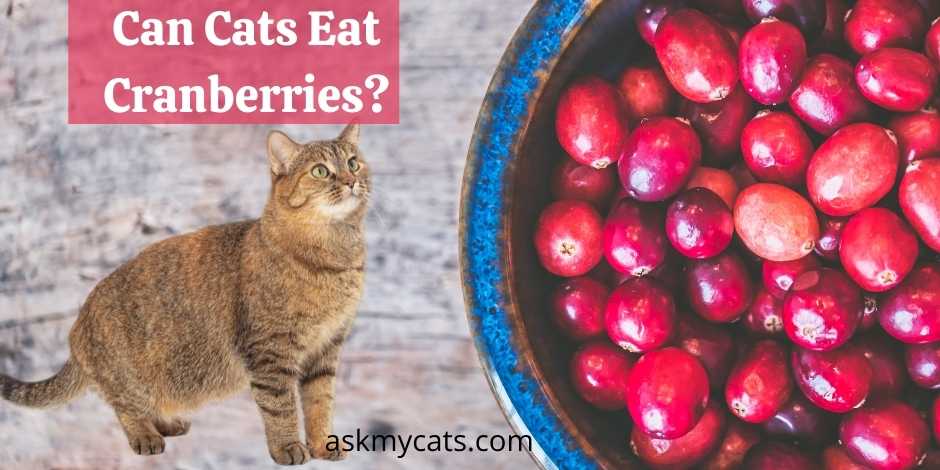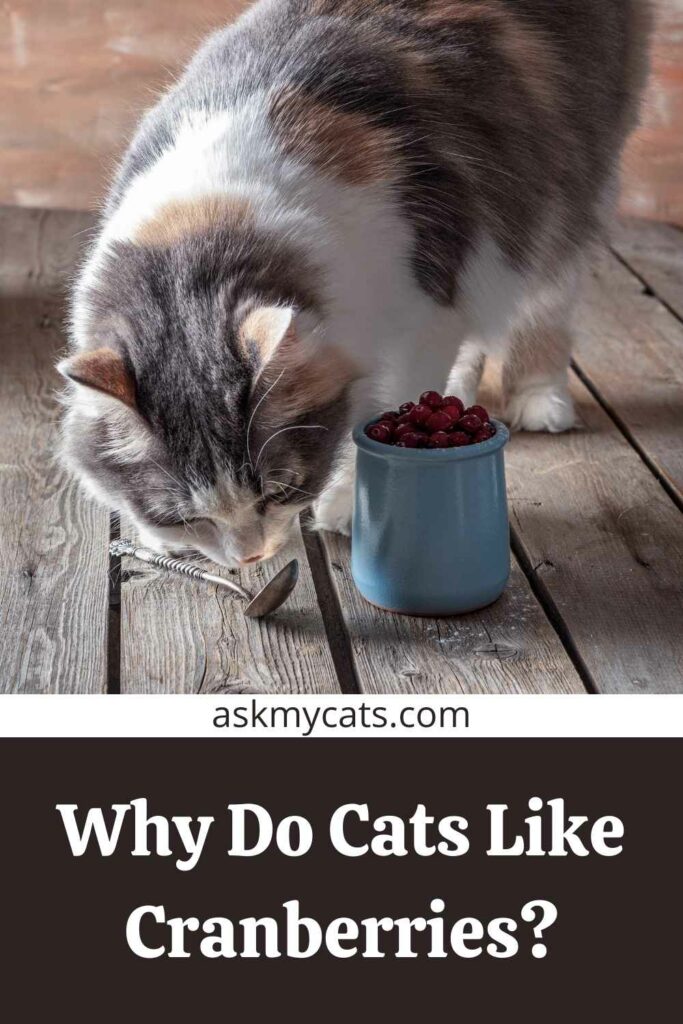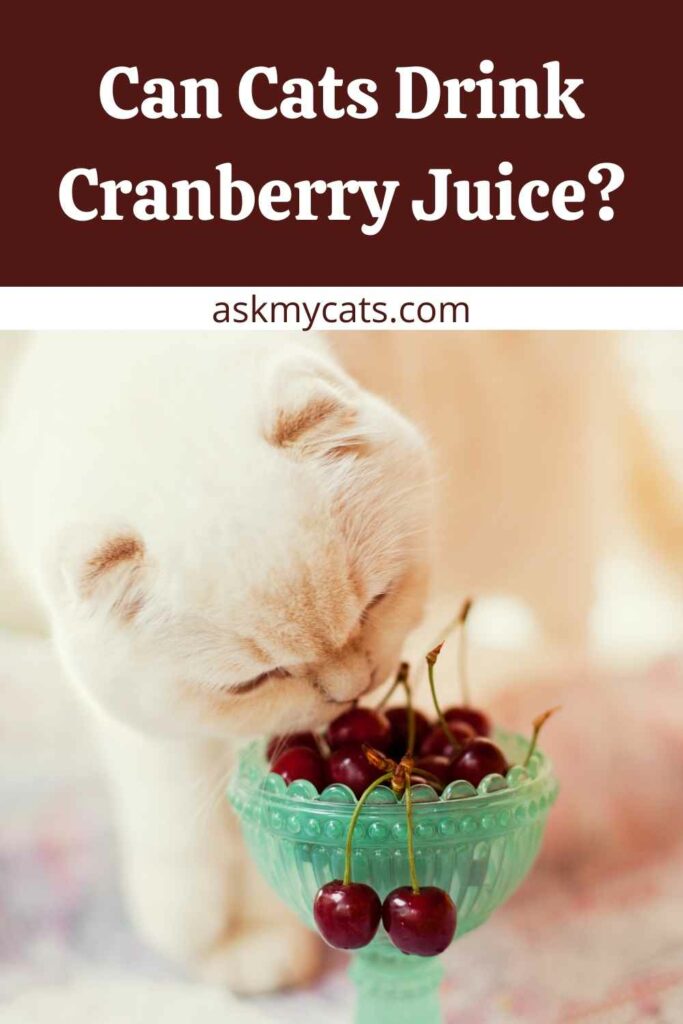Meat-eating cats are well-known. Did you know, though, that fruits and vegetables like cranberries may also benefit your feline companion?
During the Christmas season, you may have found yourself putting a few cranberries into your mouth and wondered whether you might share them with your cat.
Cranberries are safe for cats to consume. Cranberries, with their numerous health advantages, would be an excellent addition to your cat’s diet over time.
Cranberries are simple to come by and may be prepared in a variety of ways for your cat. Here’s all you need to know about giving your cat cranberries.


Give Your Cat the Perfect Day
Get the Free Ebook!
Why Do Cats Like Cranberries?
Cats like cranberries because they are tasty to eat.

Vitamins A, C, and K are abundant in cranberries. Iron, copper, and magnesium are among the key minerals found in them.
Even better, according to some research, cranberries can aid both humans and pets who are suffering from a urinary tract infection. This is because cranberries are known to increase the acidity of the urine. As a result, germs have a harder time thriving in the environment.
Despite the fact that many people believe cranberries can aid with urinary tract infections, other medical research contradict this.
Some even believe that the high oxalate content of cranberries might agitate some cats and cause bladder problems. So, if you’re thinking of introducing cranberries to your cat’s diet, whether fresh, juiced, or as a supplement, you should talk to your normal vet first.
Cats, like people, require a diverse range of nutrients in order to be healthy and maintain a great quality of life. Your cat requires a daily amount of vitamin C, and unlike humans, cats can typically produce it on their own.
Vitamin C boosts the immune system, making it easier for your cat to fight germs and viruses. It also supports the thymus gland and helps wound healing.
Cranberries are a good source of vitamin C. Cranberries also includes a variety of other vitamins and minerals, including vitamin K and manganese, which are beneficial to cats’ health. These little brilliant red fruits also contain phytochemicals that can aid in the prevention of bladder stones and urinary tract infections caused by E. coli strains.
Furthermore, cranberry extract could help prevent plaque and teeth decay, thus saving you money on vet visits in the future. Despite the fact that cats are carnivores by nature, cranberries may be helpful to your cat’s diet just as they are to yours.
Can Cats Drink Cranberry Juice?
Cats appear to tolerate plain cranberry juice. Juice with added sugar is not recommended for cats since it might create major health issues.

The majority of a cat’s diet should not consist of cranberry juice. It lacks the nutrients that a cat requires to flourish. It’s not something you should feed your cat on a daily basis.
Many cat feeds, on the other hand, incorporate cranberries in small amounts to supplement vitamins and minerals. Furthermore, cranberry is more likely to be found in urinary health diets since it may help your cat prevent urinary system disorders.
Oxalates are a chemical found in cranberries. These can result in oxalate crystals, especially if the cat already has a history of urinary tract issues.
You shouldn’t make it the majority of the cat’s food, though. It can have a serious impact on your cat’s entire nutrition. Cranberries are mostly composed of carbs. Your cat needs a diet high in protein and fat. Cranberries don’t have a lot of protein or fat in them. As a result, they should be avoided as a major component of your cat’s diet.
Only unsweetened cranberry juice will suffice for your kitten. Sugar should not be added to a cat’s diet. For humans, most juices are sweetened, but cats are considerably smaller. As a result, even if it isn’t a lot for the ordinary adult person, sugar is a lot for them. Sugary beverages and meals should thus be avoided by all cats.
Is Cranberry Good For Cats With UTI?
Yes, cranberry is good for cats suffering from UTI because they make urine acidic and free from germs and bacteria.

Cranberry juice is frequently prescribed for those with urinary tract problems. Many hypotheses exist as to why cranberries might aid with urinary tract issues.
It’s possible that it makes your pee more acidic, which inhibits bacteria development. It may also prevent bacteria from adhering to the walls of the urinary system, allowing them to be flushed out.
There haven’t been many researches on cats and cranberries. We don’t know if cats digest and absorb cranberries in the same way that humans do. We don’t know how well they absorb cranberries. Plant-based sources are deficient in a number of nutrients that cats cannot ingest.
Although no research have been done on this yet, some of the nutrients in cranberries may be comparable. We don’t know if cranberries are good for a cat’s urinary health at the moment. Because there hasn’t been enough research done, this is the case.
We do know, however, that all of the added sugar may be hazardous to cats. As a result, if you decide to offer your cat cranberry juice, be sure it doesn’t include any added sugar.
A veterinarian should be consulted if you have a urinary tract infection. Most of the time, an antibiotic will be administered, which will offer your kitty with immediate relief. However, the precise bacteria causing the UTI will almost always need to be determined, which will almost always need a culture.
Since this might take a few days, the veterinarian may give a broad-spectrum antibiotic to provide some long-term relief.
Certain diets may help to avoid urinary tract issues. However, you should consult your veterinarian before making any changes to your cat’s food. Particular cats may be more prone to UTIs than others, and they may require a different diet to avoid infection in the future.
Cranberries are frequently used as a home treatment for UTIs in humans. However, there hasn’t been much research done on how they work on cats. Many fruits are not a natural component of your pet’s diet, even though they may help prevent future UTIs. As a result, you should avoid pushing proteins and fats out of your diet.
Any UTI should be treated by your cat’s veterinarian. Inquire if adding cranberry juice to your cat’s food might be beneficial. For example, your cat could be advised to eat cranberry-flavoured foods.
How Much Cranberry Should I Give My Cat?
You should always give small portions of cranberry to your cat.
Cats are not poisoned by cranberries. However, you should consult your veterinarian to see if they are acceptable for your particular pet. You can give your cat a taste of cranberries after getting permission from your veterinarian.
To begin, double-check that the cranberries you’re giving your cat are 100% cranberry. Commercially available cranberry juice frequently has added sugar, and dried cranberries may also contain additives other than the fruit.
If you believe that include cranberries in your cat’s diet may benefit him, consult your veterinarian about the best type of cranberries to use and the proper amount.
Can I Give My Cat Human Cranberry Pills?
Yes, you can give your cat human cranberry pills one capsule twice daily.
Can Cats Eat Dried Cranberries?
Dried cranberries are safe for cats to consume and provide several health advantages to cats.
However, because cats dislike the sweet and sour tastes of cranberries, you may not be able to persuade your cat to consume this delicacy. Choose pet diets and treats that have cranberries as an ingredient instead.
While raw and dried cranberries are OK to offer to cats, other cranberry-containing foods, such as cranberry sauce, cranberry juice, and cranberry-flavoured snacks, may not be. It’s critical to double-check that any additional substances in meals are appropriate for cats to ingest, since some might be hazardous to them.
If you’re not sure whether a food is safe, err on the side of caution and don’t feed it to your cat. Dried cranberries have a distinct flavour and appearance from raw, fresh cranberries. They are, nevertheless, nutritionally extremely similar.
As a result, feeding cranberries to your cat is perfectly safe. Your cat may not love them as much as fresh cranberries, despite the fact that they are a safe and healthful food for cats.
Can Cats Eat Cranberry Sauce?
Cats should not consume cranberry sauce. Yes, cranberries help cats’ urinary health, but the extra sugars in cranberry sauce can be harmful to their health.
Instead, give your cat a tasty cranberry cat treat that is both healthful and safe.
You should think twice about providing your cat cranberries in the form of a juice or sauce. Both cranberry sauces and juices are heavy in sugar, which may not be hazardous to your cat in the short term but can be toxic over time or in large quantities.
Frequently Asked Questions
Is cranberry toxic to cats?
It’s fine to share cranberries with cats and dogs because they’re typically harmless. However, eat in moderation. If your dog or cat eats too many cranberries, dried cranberries, or sauces, they may develop stomach trouble, so give them judiciously.
Are cats allergic to cranberry?
Cranberries are rich in vitamin C, fibre, and manganese, making them an appealing snack for cats and dogs that can withstand the acidity. Cranberries, raw, cooked, or dried, are suitable treats, but cranberry sauce and cranberry juice, which are heavy in sugar and could upset your dogs’ stomachs, should be avoided.
Can I feed my cat blueberries?
Blueberries are not harmful to cats. Blueberries aren’t considered a superfood for cats, however the antioxidants in blueberries are beneficial to cats as well. Blueberries are also excellent for cats because of their high fibre and water content.
Final Words
Cranberries are commonly thought of as a delicious holiday treat, but when you check at the nutritional content; you’ll see that they’re much more! Cranberries are high in vitamins and minerals, which are beneficial to both humans and pets.
While it is not recommended that you throw a raw berry at your pet, it is encouraged that you give them supplements that contain cranberries and their various advantages.
Have you ever given your cat cranberries? How did they go over with your cat? Let us know what happened in the comments section below!
